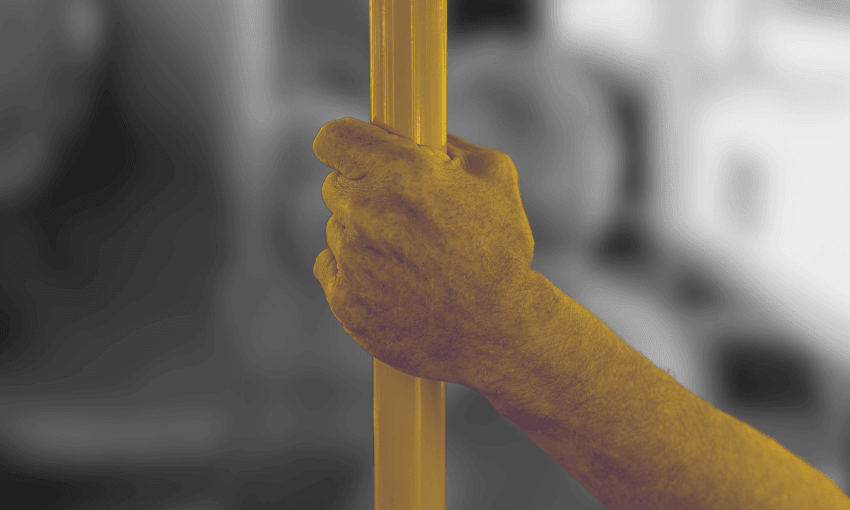Pugnacious and genial; monosyllabic yet capable of gloriously subversive narratives; battered by life but proud as a peacock. Everyone who catches the No 8 bus knows Murray, writes David Hill.
The Spinoff Essay showcases the best essayists in Aotearoa, on topics big and small. Made possible by the generous support of our members.
Here’s Murray. That’s as good a pseudonym as any.
I know Murray from riding the No 8 bus. For the previous three… four years I’d seen him as I made my tiny contribution to emissions reductions. There he’d be, trudging along from the supermarket with his shopping bags. Now his knees are stuffed, so he takes the bus, too.
Murray’s never owned a car; certainly isn’t going to spend money on taxis. “First time I tried one, the bugger wanted me to wipe m’feet before I got in. I told him where to stick his cab.”
Let’s describe him. He’s stumpy, seamed, shabby, wears rumpled, non-designer jeans, a saggy T-shirt with a similarly shaped jumper. His hair is a neck-length tangle under a faded baseball cap; face and hands are blotched with sun lesions. He clearly doesn’t use a manicurist, and he isn’t boosting shares in the dental floss or shampoo or skin-gloss markets.
He’s been retired for five years or so. He never married; has no kids: “Was a drinker till m’30s; I’d have been a shit of a father.” Universal super is his only income, though money from his mother meant he was able to buy his own place. It’s five streets away from where we live, and its general appearance matches Murray’s. He’s utterly content there: “They’ll have t’carry me out.”
He’s undoubtedly an interesting neighbour. Murray’s place is number 17. A year back, number 19 sprouted a FOR SALE sign. The next day, Murray’s front gate also bore a sign: Someone PLEASE buy next door. I want rid of them.
I learned Murray’s name soon after he started riding the No 8 bus. All the drivers and most of the passengers know him now. You can’t help but know him: he’s pugnacious and genial; monosyllabic yet capable of gloriously subversive narratives; battered by life but proud as a peacock.
He greets me by name. He must have asked someone; rates me enough to want to acknowledge me. I find that boosting and endearing.
What do we talk about? Idiot drivers, whom you can see clearly from the high seats of a bus. Governments both national and local, and the drongos who run them. How banks and insurance companies rip you off. How the cost of things has got beyond funny. The American Civil War.
You read that last bit correctly. Murray is dyslexic. (He says “dycslectic”, which sounds much better.) He’s got no TV – “rots ya brain” – listens mostly to spoken features on National Radio (you read that correctly as well) and occasionally to talkback. “Bloody idiots who call in; must live under a rock, half of them.”
But he’s managed to read everything he can find on the 1860s Union-Confederacy conflict. He mentioned it tentatively at first, in case I dismissed or condescended to him. When I showed genuine interest, and especially when I told him how I’d failed school certificate history decades back, battles and campaigns and social analyses started streaming from him. “Used to think I’d go there some day; walk a few of the battlefields. Dream on, eh?” It’s said with a shrug; Murray doesn’t do self-pity.
He hasn’t always got time to do his reading. Here’s a snapshot of a Murray morning: “Woke up and thought – ‘Shit, I’m runnin’ out of meds for m’teeth’. Had to catch the bus into town, then another one across to where the dental quack is, then back again. Wasn’t home till after lunch.” A glance at Murray’s yellowing, straggling fangs suggested he may have left things a bit late with the meds, but again, he wasn’t complaining, just stating.
And here’s another morning, when I met him coming home on the bus with shopping bags straining: “It’s 70 cents off a sliced white loaf at Eastlands. Got enough here to stick in the freezer and last me two months.” He wasn’t triumphing, either, just sharing the economic struggles he assumes everyone has.
Early in November, I asked Murray if he’d had any trick-or-treaters the previous week. “Nah. Keep the front gate locked in case any Mormons turn up.”
He does observe some other festivals, though. “Still got a few fireworks; keep them in the hot-water cupboard in case those irritating do-gooders get them banned.” No, he didn’t say “irritating”, but this is a family-friendly website.
He observes social courtesies as well. It was he who told a trio of raucous 17-year-olds on the No 8, “Watch your language, eh, guys. There’s ladies here.” He who lifts moss-slow old Linda’s shopping trolley off the same bus at her stop; near enough lifts her off as well. He who talks to afflicted, muttering and lurching Tane, claps him on the shoulder as they guffaw together.
I mustn’t make Murray into a knight errant, though he does make sure the stray kittens dumped in the reserve behind his place get picked up by the SPCA. He has his fair share-plus of prejudices and preconceptions, misinformation and misanthropy.
He’s wary of any officialdom; obeyed Covid lockdowns but wouldn’t do so again. “They better not bloody try.” He knows the wealthy are out to get the rest of us; that any bugger of any gender in a suit is automatically untrustworthy – though he reckons Donald Trump could teach our politicians a thing or three.
We get along; I believe we both enjoy our contact. But I know that one throwaway, clever-clever comment from me, one arty-farty or bleeding-heart leftie lapse, and I’d switch from being Dave to being that prick with the beard.
Murray can make me feel humble. Partly it’s the shoulder-shrugging, middle-finger-lifted stoicism and defiance I see in him. Partly it’s our improbable discourse: on the one hand, a tertiary graduate who’s never had to strain his body for a living, on the other, a left-school-at-15 tar-seal truck worker/kitchen hand/warehouse labourer whose body has been his only employment asset. Add to that my lurking awareness that there but for genetics, environment, choices, I may have gone, too.
Why else does he interest me? Because by almost any criteria, he’s not a success, and such people are often more complex, interesting, affecting than so-called winners.
Plus he’s increasingly significant: the Murrays of Aotearoa have been comfortably ignored for a long while, or presented only as statistics, election slogan stereotypes, sentimental caricatures. Now social media have given them a voice – a challenging, edgy, potentially rebellious one, with increasing power at the polls.
Mostly, I wanted you to meet him because of the conviction he gives me that in a society where the top 2% and bottom 20% are now so far apart, they can’t see one another over the horizon, fairness, respect, charity and compassion, aspirations and hopes are still universally acknowledged.
Talking to Murray has taught me far more than reading any politician’s honkings about “decent, fair-minded Kiwi battlers”. They say it; Murray shows it. I hope I’ll see him on the No 8 this week.

